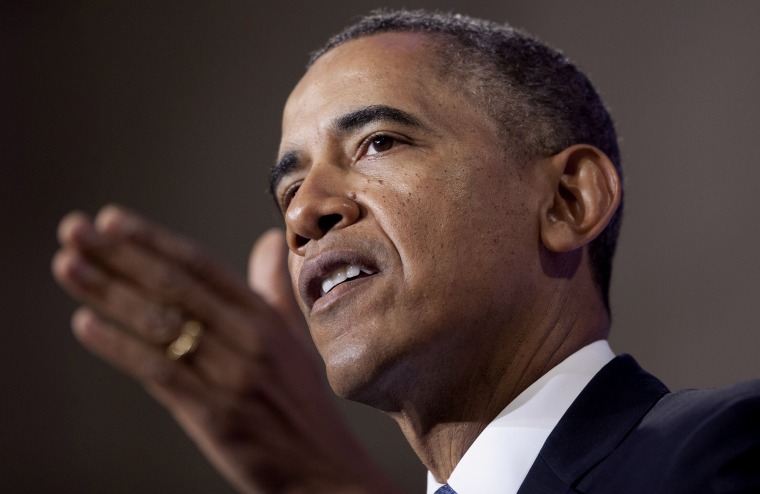Though billed by his advisers as a series of sweeping changes to surveillance policy, President Barack Obama's Friday speech on surveillance largely leaves the big decisions in Congress' hands--with little guidance as to how they should proceed.
"I think it was an important first step for him to recognize that there is a danger in the government collecting this information in the first place," says Michelle Richardson of the American Civil Liberties Union. "He didn't go as far as his own review group recommended."
From now on, the National Security Agency will be able to query only phone records it collects with permission from the foreign intelligence surveillance court, and the scope of its searches will be smaller. That's not an end to bulk collection--at least not yet--it's shrinking the size of the bulk.
"Ultimately he's leaving the door open to continued bulk collection of information, both for U.S. persons and non-U.S. persons," said Cynthia Wong of Human Rights Watch. "The U.S. government hasn't made the case for why bulk collection is necessary."
Obama has said the government should no longer hold telephone records, but did not say whether communications companies should hold onto those records or whether they should be held by a third party. The president also left unsaid what would happen if Congress fails to come up with a solution.
For privacy advocates, mandating that private companies retain the information or allowing a third party to do so is a distinction without a difference, and would amount to continued bulk collection by another name.
But Geoffrey Stone, a law professor at the University of Chicago who served as a member of the president's surveillance policy review board, said that's exactly what they recommended. "I think the civil liberties groups are wrong on that: bulk collection can be a critical tool for keeping the nation safe," said Stone. "The trick here was to preserve that, while at the same time ensuring privacy and civil liberties are protected, and on that score he accepted our recommendations which we think strikes the right balance." The report said the metadata program was not "essential" to fighting terrorism, but that it could be useful in the future.
Stone added that calling for an end to government possession of the metadata was "the single most important thing that he could have done today."
Lawmakers in the presidents' own party, including longtime critics of government surveillance policy, praised the president's speech. Democratic Senators Ron Wyden of Oregon, Mark Udall of Colorado, and Martin Heinrich of New Mexico called the speech "a major milestone in our longstanding efforts to reform the National Security Agency’s bulk collection program." Vermont Democratic Senator Patrick Leahy, whose joint surveillance reform proposal with Wisconsin Republican Rep. Jim Sensenbrenner has garnered major bipartisan support in the House, said Obama was "helping to restore the nation's historic role as a beacon of individual freedoms, under the rule of law."
Republican lawmakers were less effusive. Michigan Republican Rep. Justin Amash, whose proposal to end the NSA's bulk collection program came within a handful of votes of passing the House last summer, said Obama had refused to "end the unconstitutional violation of Americans' privacy, stop the suspicionless surveillance of our people, and close the era of secret law," and he called on Congress to act.
Congress was always going to be the most important player here. "Congress is going to have to decide whether to reauthorize [Section 215] in its current form, whether to reauthorize it with changes, or whether to reauthorize it at all," said Stephen Vladeck, a law professor at American University. "In that regard, the biggest takeaway from the speech is how little of a thumb the president is placing on that particular scale."
Sensenbrenner, in his reaction to the speech, praised Obama's "good intentions" but emphasized that Congress must make significant changes--and not just to the metadata program, or but other significant surveillance authorities that the president's speech didn't address. "The bottom line is real reform cannot be done by presidential fiat," Sensenbrenner said in his statement. Democratic California Rep. Adam Schiff, who has also proposed legislation curtailing some of the NSA's powers, said it was "up to Congress to implement many of these changes, as well as others, and to ensure that they are durable across future Administrations."
Beyond the metadata program, other crucial surveillance matters remain in the aftermath of Obama's speech. The president's surveillance policy review board called for judicial oversight of national security letters, which the government can use to acquire business records without a warrant, but Obama rejected that proposal. "There was a lot of pushback from the FBI, and he accepted that pushback," Stone said. "The FBI was resisting that very strongly."
While the president's proposed changes to how the NSA accesses telephone metadata are significant, other kinds of records can be accessed under Section 215 of the Patriot Act. Obama didn't address larger changes to the law, as opposed to the NSA's metadata program itself. Other privacy advocates are concerned that the president failed to address the NSA's alleged weakening of encryption standards.
"Obama did leave the door open for Congress to walk right through if they wanted to be more assertive," Richardson said. "It still leaves us with a lot of work to do."
